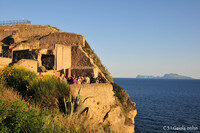
On 7th July 2012 a prestigious charity night for leukemic children of Santobono Pausilypon Hospital - Carmine Gallo onlus Association. «Rends moi le Pausylippe et la mer d'Italie...». Piano récital by Paloma Kouider e M° Aldo Ciccolini.

On 7th July 2012 a prestigious charity night for leukemic children of Santobono Pausilypon Hospital - Carmine Gallo onlus Association. «Rends moi le Pausylippe et la mer d'Italie...». Piano récital by Paloma Kouider e M° Aldo Ciccolini.

"Nuits d'été à Pausilippe" consists in a season of 60 minutes long concerts held at sunset without artificial light and voicing, in absolute regard to the archeological area. The audience will be welcomed at the Seiano's Cave and will reach the theatres area where the concerts will take place. These ones will be held at the Theatre or Odeion, to take advantage at best of the acoustics and the natural scenography.

The idea is to offer many musical emotions at sunset to Neapolitan and foreign audience, proposing in one of the best archeological sites in the world some pieces of classic and modern repertoire and unpublished songs. The intention is also to give room to Neapolitan and European young musicians who will perform with world great masters. «Les nuits d'été à Pausilippe», a Gaetano Donizetti's melodies collection published in Naples in 1836, is the inspirer of this musical event which wants to enhance the extraordinary beauty of the archeological and environmental Pausilypon district.